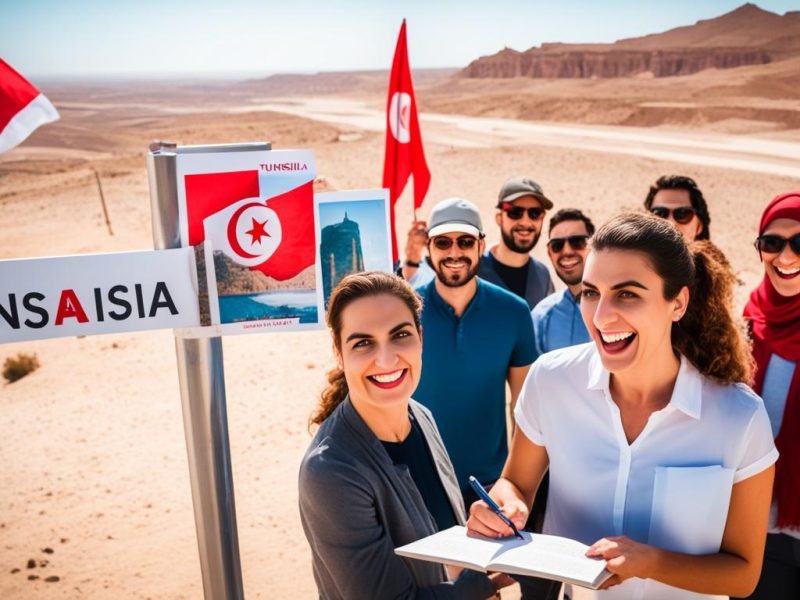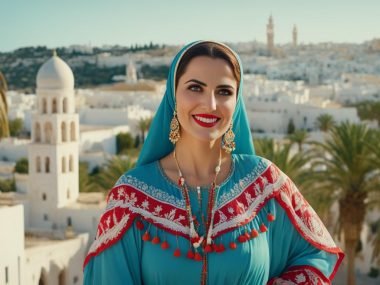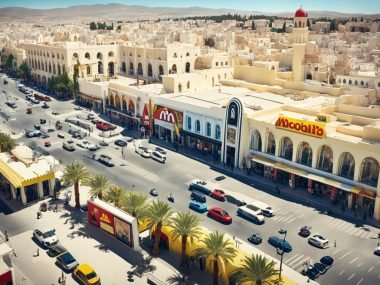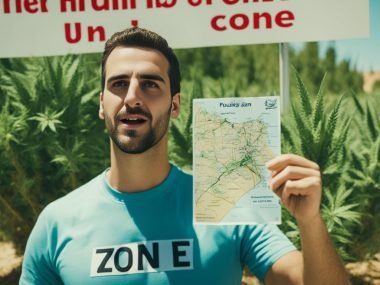Did you know nearly everyone in Tunisia can read and write Arabic? This is because of the country’s long history with the Arabic language. The Tunisian Constitution says Arabic is the official language. Besides Arabic, you’ll see Roman letters because of the French past. This is on road signs and maps. Tunisian Arabic is what most locals speak. It’s similar to other Arabic dialects in the region.
Key Takeaways
- Modern Standard Arabic is the official language of Tunisia, as documented in the constitution.
- A majority of the population speaks Tunisian Arabic as their native tongue.
- Roman script, particularly in French style, is also widely used for road signage and mapping.
- French is still prominent as a second language, spoken by approximately 63.6% of the population.
- The country boasts a near 100% literacy rate in Arabic, owing to its comprehensive educational system.
Introduction to Tunisia’s Linguistic Landscape
Tunisia’s language history is like a colourful quilt. It’s made from pieces of many cultures and times. Ancient Phoenician people and French colonizers have both left their mark. Together, they shaped today’s Tunisian dialect and official language.
Historical Overview
The official language of Tunisia has changed with each new ruler. First were the Phoenicians who started Carthage. Then, Romans brought Latin and Byzantine ideas. Arabs came in the 7th century with Arabic, mixing old and new languages together. Later, Ottoman Turks and French colonizers added to this mix.
Modern Context
Today, Arabic is Tunisia’s official language. But, the real picture is much more complex. People use Modern Standard Arabic for formal things. Yet, in daily life, they speak Tunisian Arabic, or “Derja.” This dialect is a mix of all who have influenced Tunisia. It shows the country’s rich culture.
In government and schools, Modern Standard Arabic is very important. It shows it’s the main language of Tunisia. French is also widely used, because of the history with France. This shows how history impacts today’s language use.
Main Language: Modern Standard Arabic
In Tunisia, Modern Standard Arabic (MSA) is very important. It is the Tunisia official tongue and shows who they are as a nation. It touches many parts of life in Tunisia.
Educational Use
MSA is key in Tunisia’s schools. It is the main way teachers talk to students. This helps Tunisia connect with other Arab countries. It also keeps the country united.
From young kids to university students, everyone learns MSA. It’s needed for doing well in school and work.
Official Government Language
MSA is also used a lot by the government. It’s the only language for official work. This shows how key Arabic is in Tunisia.
It helps everyone in the country understand each other. It makes sure everyone is part of the community.
Tunisian Arabic: The Vernacular Tongue
Tunisian Arabic, or Tounsi, is the main language for most Tunisians. It shows Tunisia’s rich history. Although Modern Standard Arabic is official, Tounsi tells us more about Tunisia’s diverse past.
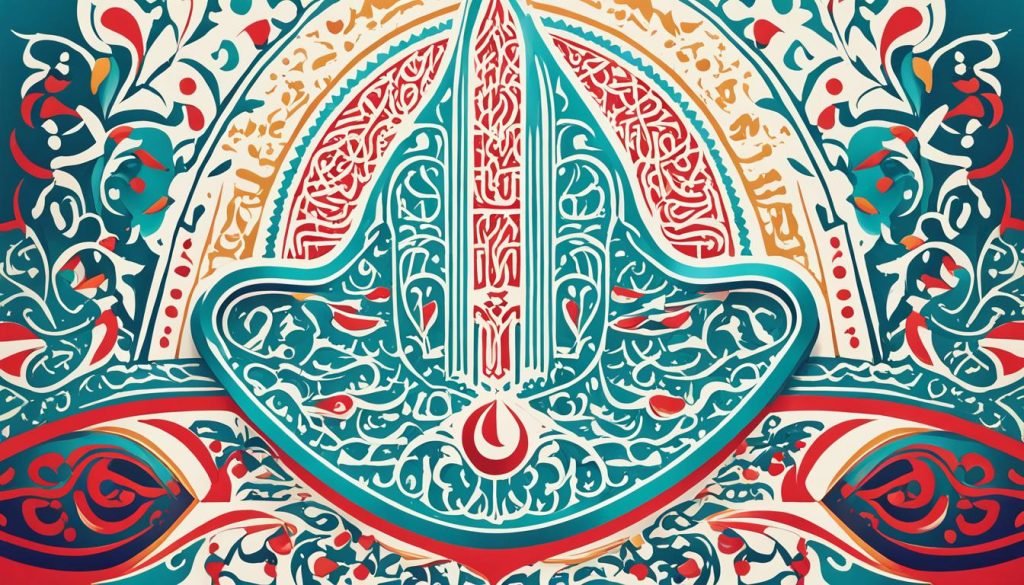
Linguistic Characteristics
The Tunisian dialect mixes many languages. It has words from Arabic, French, Italian, and English. This makes Tounsi special compared to other Arabic dialects.
It also sounds different. These unique sounds make Tounsi both complex and interesting.
Code-Switching with Other Languages
In Tunisia, people often switch between languages. They use Tunisian Arabic, French, Italian, and English daily. This shows Tunisia’s love for many languages.
It happens both in everyday talks and official events. The Tunis, dialect shows Tunisia’s cultural wealth. It fits well with the official languages.
French: The Prestige Language
French is very important in Tunisia. It came during colonial times. It shows European impact on Tunisia’s language. French is seen as classy and a sign of being high up in society.
Colonial Influence on Language
French came to Tunisia during colonial times. The French brought their language. It mixed into Tunisia’s admin and schools. Arabic stayed the official language. But French became the language of top people and those who went to school.
Current Usage in Tunisia
French is still very respected in Tunisia today. It’s big in business and higher education. It’s used in universities and science. It helps in professional settings. It shows education and high status.
| Aspect | Role of French |
|---|---|
| Education | Main language in higher education and scientific research |
| Government | Secondary role, mostly in specific documents and proceedings |
| Business | Commonly used in corporate environments and international trade |
| Social Status | Considered a marker of sophistication and high education |
The mix of French from colonial times and now is interesting. It shows French is still key in Tunisia. This language from the past helps modern Tunisia move forward.
Minority Languages in Tunisia
Tunisia has a rich mix of languages. Among these, the Berber languages and Judeo-Tunisian Arabic are key. They show Tunisia’s deep history and cultural mix, even though not many people speak them.
Berber Languages
In Tunisia, Berber languages, or Shilha, are mostly spoken in the south. They are found in villages where traditions are still strong. These languages have lived through many changes.
They are an important part of Berber communities’ identity. Even with Arabic and French being dominant, Berber languages show the Berber people’s strength and culture.
Judeo-Tunisian Arabic
Judeo-Tunisian Arabic is key among Tunisia’s minority languages. It is mostly used by the Jewish community. This special form of Arabic adds to Tunisia’s language mix.
Its use has gone down over time. Yet, it remains a precious part of Jewish cultural heritage in Tunisia. It shows the history and role of the Jewish people in the area.
What Is The Official Language Of Tunisia?
In Tunisia, the big rule book and office talk all use Modern Standard Arabic. To know what is the official language of Tunisia?, look at the big rules and everyday life. Arabic is super important there.
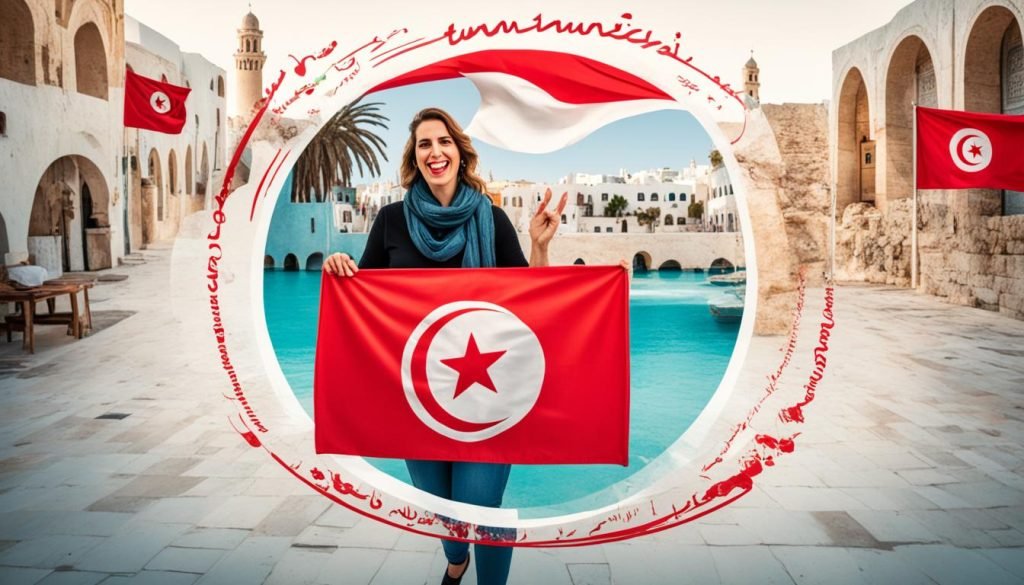
Tunisian Constitution
The Tunisian rule book says Modern Standard XII Arabic is the nation’s official speech. It’s key for the country’s identity and how it’s run. Every law and official paper is in Arabic. This makes sure everyone speaks the same legal language.
Role in Society and Governance
What is the official language of Tunisia? Also, Arabic is everywhere in education, courts, and government work. It’s a must for everyday life in Tunisia. It’s also a sign of the country’s culture and history.
Tunisian Arabic and Its Relation to Maltese
Tunisian Arabic and Maltese share a common history. They come from the same root language, Siculo-Arabic. This is mainly due to Arabic influences from Tunisia.
Historical Connections
These languages’ history began in the medieval era. Then, the Arab world expanded into the Mediterranean. They influenced many areas, including Sicily and Malta.
People from Tunisia moved to Sicily, speaking Tunisian Arabic. Soon, Siculo-Arabic was born in the region. It’s a mix of Tunisian Arabic.
Language Similarities
Tunisian Arabic and Maltese are quite alike. They have similar words, sounds, and grammar. This is because they started from the same language.
Both languages also borrowed words from other languages. Maltese has words from Italian, English, and French. Tunisian Arabic has taken in words from French and Berber.
| Aspect | Tunisian Arabic | Maltese |
|---|---|---|
| Origin | Descended from Maghrebi Arabic | Descended from Siculo-Arabic |
| Influences | Influenced by Berber, French, and Italian | Influenced by Italian, English, and French |
| Script | Arabic script for formal contexts | Latin script |
| Usage | Spoken widely in Tunisia | Official language of Malta |
The Role of Foreign Languages
Tunisia has many languages. Among them are Arabic and French. There are also languages like English and Italian. These are part of daily life in Tunisia. This is thanks to tourism and the media.
English and Italian
English is becoming more popular in Tunisia. Many schools are now teaching it. This is because English is important for jobs and studying.
Italian is also spoken in Tunisia. This is because of past connections and business ties. Italian culture has a big influence, especially in the north.
Tourism and Media Influence
Tourists speaking English or Italian visit Tunisia. They help spread these languages in shops, hotels, and tours. This makes it easier to talk to visitors from other countries.
Media in Tunisia also shows content in many languages. This helps blend different cultures together. It’s more than just talking; it’s sharing culture.
| Language | Primary Influence | Sectors |
|---|---|---|
| English | Globalisation | Education, Business, Media |
| Italian | Historical Ties | Tourism, Economic Cooperation |
Conclusion
Tunisia’s language story is like a beautiful quilt made from history, culture, and how it’s run. Modern Standard Arabic is Tunisia’s main language. It links people deeply to their history. This language is key for official talk, school, and how the country works.
Tunisian Arabic brings everyday chats to life. It connects old times to today. It mixes with French because of Tunisia’s history and connections today. This mix makes talking in Tunisia special.
Other languages add to Tunisia’s language picture too. Berber and Judeo-Tunisian Arabic show Tunisia’s rich past. English and Italian are getting more popular because of tourists and global media. Tunisia’s many languages don’t just tell its history. They also show a future filled with many voices making a wonderful culture.

